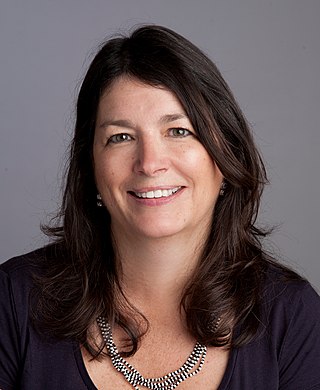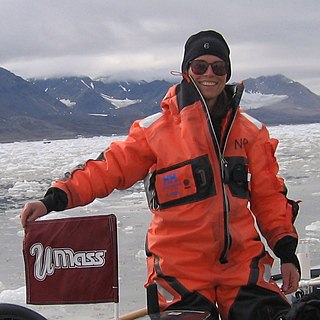
The British Geological Survey (BGS) is a partly publicly funded body which aims to advance geoscientific knowledge of the United Kingdom landmass and its continental shelf by means of systematic surveying, monitoring and research.
Sir Kingsley Charles Dunham was one of the leading British geologists and mineralogists of the 20th century. He was a Professor of Geology at the University of Durham from 1950–71. He was later Professor Emeritus from 1967–2001. He was director of the British Geological Survey from 1967–75.
The Jackson School of Geosciences at The University of Texas at Austin unites the Department of Geological Sciences with two research units, the Institute for Geophysics and the Bureau of Economic Geology.
Sir Robert Keith O'Nions FRS HonFREng, is a British scientist and ex-President & Rector of Imperial College London. He is the former Director General of the Research Councils UK as well as Professor of the Physics and Chemistry of Minerals and Head of the Department of Earth Sciences at the University of Oxford.
Michael Frogley is a Quaternary palaeoecologist whose research interests currently include:
- the use of stable isotope geochemistry to help determine the climatic histories of lake basins;
- the analysis of changes in Quaternary palaeobiogeographical patterns of selected invertebrate faunal groups, particularly around the Mediterranean; and
- the relationship between rapid-scale climatic change and societal collapse in the Andean highlands of Peru.

Maureen E. "Mo" Raymo is an American paleoclimatologist and marine geologist. She is the Co-Founding Dean of the Columbia Climate School, Director of the Lamont–Doherty Earth Observatory of Columbia University, the G. Unger Vetlesen Professor of Earth & Environmental Sciences, and Director of the Lamont–Doherty Core Repository at the Lamont–Doherty Earth Observatory of Columbia University. She is the first female climate scientist and first female scientist to head the institution.

Donald James DePaolo is an American professor of geochemistry in the department of earth and planetary science at the University of California, Berkeley and associate laboratory director for energy and environmental sciences at the Lawrence Berkeley National Laboratory.
Kliti Grice, is a chemist and geochemist known for her work in identifying geological and environmental causes for mass extinction events. Her research integrates geological information with data on molecular fossils and their stable carbon, hydrogen and sulfur isotopic compositions to reconstruct details of microbial, fungal and floral inhabitants of modern and ancient aquatic environments and biodiversity hot spots. This information expands our understanding of both the Earth's history and its current physical state, with implications ranging from energy and mineral resource exploration strategies to environmental sustainability encompassing climate dynamics and expected rates, durations and scale of our future planet's health. As one of the youngest women professors in Earth Sciences, she is the founding director of the Western Australian Organic and Isotope Geochemistry Centre (WA-OIGC) and is a Professor of Organic and Isotope Geochemistry at Curtin University in Perth, Western Australia.

Jane Anne Plant CBE, FREng, FRSE, FRSA (1945–2016) was a leading geochemist, scientist, and author. Plant was a pioneer in the field of geochemical surveys and environmental surveys. She was Chief Scientist at the British Geological Survey and was a Professor of Geochemistry at Imperial College London. Plant was also highly involved in the Institution of Mining & Metallurgy where she was involved in many aspects including a role on the Council, and was the first female President of the Institution of Mining & Metallurgy, a post she held from 2001 to 2002. This gave her an extensive network of key connections with government, industry and academia.
Dominique Weis is a Canadian scientist. She is a Canada Research Chair in the Geochemistry of the Earth's Mantleat at the University of British Columbia.
Joel D. Blum is a scientist who specializes in isotope geochemistry and environmental geochemistry. He is currently a professor of Earth and Environmental Sciences at the University of Michigan and an elected member of the National Academy of Sciences. Blum has several named professorships including the John D. MacArthur, Arthur F. Thurnau and Gerald J. Keeler Distinguished Professorship. Blum is a past Co-Editor- in-Chief of Chemical Geology and Elementa, and is the current Editor-in-Chief of the American Chemical Society journal Earth and Space Chemistry.
Aradhna Tripati is an American geoscientist, climate scientist, and advocate for diversity. She is a professor at the University of California, Los Angeles (UCLA) where she is part of the Institute of the Environment and Sustainability, the Department of Earth, Planetary, and Space Sciences, the Department of Atmospheric and Oceanic Sciences, and the California Nanosystems Institute. She is also the director of the Center for Diverse Leadership in Science. Her research includes advancing new chemical tracers for the study of environmental processes and studying the history of climate change and Earth systems. She is recognized for her research on climate change and clumped isotope geochemistry. She studies the evolution of atmospheric carbon dioxide levels and the impacts on temperature, the water cycle, glaciers and ice sheets, and ocean acidity.
T. Kurtis (Kurt) Kyser was an American and Canadian geologist and geochemist, Fellow of the Royal Society of Canada, professor of the University of Saskatchewan and Queen's University, founder and director of the Queen's Facility for Isotope Research (QFIR). Kyser served as a president of the Mineralogical Association of Canada and as an Editor-in-Chief of the journal Geochemistry: Exploration, Environment, Analysis (GEEA).

Julie Brigham-Grette is a glacial geologist and a professor in the Department of Geosciences at the University of Massachusetts Amherst where she co-directs the Joseph Hartshorn Quaternary Laboratory. Her research expertise is in glacial geology and paleoclimatology; she has made important contributions to Arctic marine and terrestrial paleoclimate records of late Cenozoic to recent, the evolution of the Arctic climate, especially in the Beringia/Bering Strait region, and was a leader of the international Lake El’gygytgyn Drilling Project in northeastern Russia.

The Department of Earth and Environmental Sciences at The University of Manchester is one of the oldest earth and environmental science departments in the UK. The Department takes roughly 100 new undergraduates and 140 postgraduates each year, and employs 90 members of academic staff, 41 postdoctoral researchers, 27 technical staff and 20 administrative staff.

Hendratta Ali is a geoscientist who does work in hydrology, aqueous geochemistry, exploration geology and equity geoscience. Her home institution is the Department of Geosciences at Fort Hays State University. She was awarded the 2021 Geological Society of America Randolph Bromery award and Fort Hays State University President’s Distinguished Scholar Award. Ali is a native of Cameroon.
Celina A. Suarez is an American geologist. She is known for her research on using trace element and stable isotope geochemistry of fossil vertebrates and invertebrates to understand paleoecology, paleoclimatology, and taphonomy of ancient terrestrial ecosystems. She is an associate profession in the Department of Geosciences at the University of Arkansas. The dinosaur Geminiraptor suarezarum is named after Suarez and her twin sister, Marnia Suarez, co-discovers of the site on which it was found.
Judith Ann McKenzie was an American biogeochemist known for her research on past climate change, chemical cycles in sediments, and geobiology.

Karen Hanghøj is a Danish geologist with expertise in the sustainable management of natural mineral resources. In 2019 she was appointed director of the British Geological Survey. She was the first woman to take on this role since the survey was founded in 1835.
John Nicholas Ludden CBE FRSE is a British geologist, with expertise in igneous petrology and geochemistry. He was the 19th director of the British Geological Survey from 2006 to 2019, and has been president of the European Geosciences Union and the International Union of Geological Sciences.









